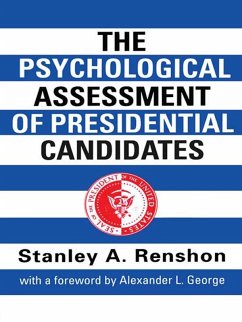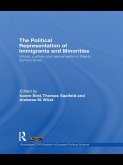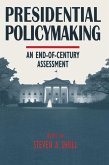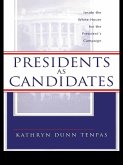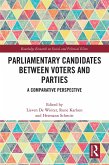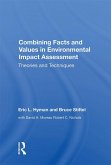Stanley A. Renshon
The Psychological Assessment of Presidential Candidates (eBook, PDF)
31,95 €
31,95 €
inkl. MwSt.
Sofort per Download lieferbar

16 °P sammeln
31,95 €
Als Download kaufen

31,95 €
inkl. MwSt.
Sofort per Download lieferbar

16 °P sammeln
Jetzt verschenken
Alle Infos zum eBook verschenken
31,95 €
inkl. MwSt.
Sofort per Download lieferbar
Alle Infos zum eBook verschenken

16 °P sammeln
Stanley A. Renshon
The Psychological Assessment of Presidential Candidates (eBook, PDF)
- Format: PDF
- Merkliste
- Auf die Merkliste
- Bewerten Bewerten
- Teilen
- Produkt teilen
- Produkterinnerung
- Produkterinnerung

Bitte loggen Sie sich zunächst in Ihr Kundenkonto ein oder registrieren Sie sich bei
bücher.de, um das eBook-Abo tolino select nutzen zu können.
Hier können Sie sich einloggen
Hier können Sie sich einloggen
Sie sind bereits eingeloggt. Klicken Sie auf 2. tolino select Abo, um fortzufahren.

Bitte loggen Sie sich zunächst in Ihr Kundenkonto ein oder registrieren Sie sich bei bücher.de, um das eBook-Abo tolino select nutzen zu können.
Looking back over the past 25 years, Stanley Renshon explores how the issue of character has come to dominate presidential campaigns. Drawing on his clinical and political science training, Renshon has devised a theory which allows the public to evaluate the qualities of presidential candidates.
- Geräte: PC
- mit Kopierschutz
- eBook Hilfe
- Größe: 16.94MB
Andere Kunden interessierten sich auch für
![The Political Representation of Immigrants and Minorities (eBook, PDF) The Political Representation of Immigrants and Minorities (eBook, PDF)]() The Political Representation of Immigrants and Minorities (eBook, PDF)47,95 €
The Political Representation of Immigrants and Minorities (eBook, PDF)47,95 €![Presidential Policymaking: An End-of-century Assessment (eBook, PDF) Presidential Policymaking: An End-of-century Assessment (eBook, PDF)]() Steven A. ShullPresidential Policymaking: An End-of-century Assessment (eBook, PDF)27,95 €
Steven A. ShullPresidential Policymaking: An End-of-century Assessment (eBook, PDF)27,95 €![Presidents as Candidates (eBook, PDF) Presidents as Candidates (eBook, PDF)]() Kathryn D. TenpasPresidents as Candidates (eBook, PDF)44,95 €
Kathryn D. TenpasPresidents as Candidates (eBook, PDF)44,95 €![Parliamentary Candidates Between Voters and Parties (eBook, PDF) Parliamentary Candidates Between Voters and Parties (eBook, PDF)]() Parliamentary Candidates Between Voters and Parties (eBook, PDF)40,95 €
Parliamentary Candidates Between Voters and Parties (eBook, PDF)40,95 €![Psychological Warfare in the Arab-Israeli Conflict (eBook, PDF) Psychological Warfare in the Arab-Israeli Conflict (eBook, PDF)]() R. SchleiferPsychological Warfare in the Arab-Israeli Conflict (eBook, PDF)40,95 €
R. SchleiferPsychological Warfare in the Arab-Israeli Conflict (eBook, PDF)40,95 €![Combining Facts And Values In Environmental Impact Assessment (eBook, PDF) Combining Facts And Values In Environmental Impact Assessment (eBook, PDF)]() Eric L. HymanCombining Facts And Values In Environmental Impact Assessment (eBook, PDF)40,95 €
Eric L. HymanCombining Facts And Values In Environmental Impact Assessment (eBook, PDF)40,95 €![Asia-Pacific Regional Security Assessment 2022 (eBook, PDF) Asia-Pacific Regional Security Assessment 2022 (eBook, PDF)]() Asia-Pacific Regional Security Assessment 2022 (eBook, PDF)83,95 €
Asia-Pacific Regional Security Assessment 2022 (eBook, PDF)83,95 €-
-
-
Looking back over the past 25 years, Stanley Renshon explores how the issue of character has come to dominate presidential campaigns. Drawing on his clinical and political science training, Renshon has devised a theory which allows the public to evaluate the qualities of presidential candidates.
Dieser Download kann aus rechtlichen Gründen nur mit Rechnungsadresse in A, B, BG, CY, CZ, D, DK, EW, E, FIN, F, GR, HR, H, IRL, I, LT, L, LR, M, NL, PL, P, R, S, SLO, SK ausgeliefert werden.
Produktdetails
- Produktdetails
- Verlag: Taylor & Francis eBooks
- Seitenzahl: 534
- Erscheinungstermin: 14. Oktober 2013
- Englisch
- ISBN-13: 9781135265281
- Artikelnr.: 39704737
- Verlag: Taylor & Francis eBooks
- Seitenzahl: 534
- Erscheinungstermin: 14. Oktober 2013
- Englisch
- ISBN-13: 9781135265281
- Artikelnr.: 39704737
- Herstellerkennzeichnung Die Herstellerinformationen sind derzeit nicht verfügbar.
Stanley A. Renshon is Professor of Political Science at the City University of New York and developer and coordinator of the Interdisciplinary Program in the Psychology of Political Behavior at the CUNY Graduate School. He is a certified psychoanalyst and author of several volumes, including High Hopes: The ClintonPresidency and the Politics of Ambition (Routledge, 1998).
Introduction: Does the President's Character Still Matter?; I: ? Part I The
Concept of Psychological Suitability; 1: ? The Psychological Suitability of
Presidents in an Era of Doubt; 2: ? Assessing the Psychological Suitability
of Presidential Candidates: Ethical and Theoretical Dilemmas; II: ? PART V
Assessing the Psychological Health of Presidential Candidates; 3: ?
Psychological Health and Presidential Performance: A Foundation for the
Assessment of Psychological Suitability?; 4: ? Is the Psychological
Impairment of Presidents Still a Relevant Concern?; 5: ? Assessment at a
Distance: A Cautionary Case Study of the 1964 Presidential Campaign; 6: ?
Psychological Health in the 1972 Presidential Election: The Case of Thomas
F. Eagleton; III: ? Part III Character and Presidential Performance: Theory
and Assessment; 7: ? Toward a Framework for Analyzing Presidential
Performance: Some Observations on a Theory of Character; 8: ? Toward a
Theory of Character and Presidential Performance; 9: ? Character and
Judgment in the 1988 Presidential Campaign: A Case Study of Gary Hart; 10:
? Bill Clinton as a Presidential Candidate: What Did the Public Learn?; 11:
? William J. Clinton as President: Some Implications of Character for
Presidential Performance; IV: ? Part IV Assessing Psychological
Suitability: The Role of the Press and Presidential Campaigns; 12: ? The
Private Lives of Public Officials: Observations, Dilemmas, and Guidelines;
13: ? Election Campaigns as a Tool for Assessing the Psychological
Suitability of Presidential Candidates; V: ? PART V Assessing Psychological
Suitability: Some Applications; 14: ? Asking the Right Questions of
Presidential Candidates: Some Suggestions and Guidelines; 15: ? Conclusion:
The Good Enough President
Concept of Psychological Suitability; 1: ? The Psychological Suitability of
Presidents in an Era of Doubt; 2: ? Assessing the Psychological Suitability
of Presidential Candidates: Ethical and Theoretical Dilemmas; II: ? PART V
Assessing the Psychological Health of Presidential Candidates; 3: ?
Psychological Health and Presidential Performance: A Foundation for the
Assessment of Psychological Suitability?; 4: ? Is the Psychological
Impairment of Presidents Still a Relevant Concern?; 5: ? Assessment at a
Distance: A Cautionary Case Study of the 1964 Presidential Campaign; 6: ?
Psychological Health in the 1972 Presidential Election: The Case of Thomas
F. Eagleton; III: ? Part III Character and Presidential Performance: Theory
and Assessment; 7: ? Toward a Framework for Analyzing Presidential
Performance: Some Observations on a Theory of Character; 8: ? Toward a
Theory of Character and Presidential Performance; 9: ? Character and
Judgment in the 1988 Presidential Campaign: A Case Study of Gary Hart; 10:
? Bill Clinton as a Presidential Candidate: What Did the Public Learn?; 11:
? William J. Clinton as President: Some Implications of Character for
Presidential Performance; IV: ? Part IV Assessing Psychological
Suitability: The Role of the Press and Presidential Campaigns; 12: ? The
Private Lives of Public Officials: Observations, Dilemmas, and Guidelines;
13: ? Election Campaigns as a Tool for Assessing the Psychological
Suitability of Presidential Candidates; V: ? PART V Assessing Psychological
Suitability: Some Applications; 14: ? Asking the Right Questions of
Presidential Candidates: Some Suggestions and Guidelines; 15: ? Conclusion:
The Good Enough President
Introduction: Does the President's Character Still Matter?; I: ? Part I The
Concept of Psychological Suitability; 1: ? The Psychological Suitability of
Presidents in an Era of Doubt; 2: ? Assessing the Psychological Suitability
of Presidential Candidates: Ethical and Theoretical Dilemmas; II: ? PART V
Assessing the Psychological Health of Presidential Candidates; 3: ?
Psychological Health and Presidential Performance: A Foundation for the
Assessment of Psychological Suitability?; 4: ? Is the Psychological
Impairment of Presidents Still a Relevant Concern?; 5: ? Assessment at a
Distance: A Cautionary Case Study of the 1964 Presidential Campaign; 6: ?
Psychological Health in the 1972 Presidential Election: The Case of Thomas
F. Eagleton; III: ? Part III Character and Presidential Performance: Theory
and Assessment; 7: ? Toward a Framework for Analyzing Presidential
Performance: Some Observations on a Theory of Character; 8: ? Toward a
Theory of Character and Presidential Performance; 9: ? Character and
Judgment in the 1988 Presidential Campaign: A Case Study of Gary Hart; 10:
? Bill Clinton as a Presidential Candidate: What Did the Public Learn?; 11:
? William J. Clinton as President: Some Implications of Character for
Presidential Performance; IV: ? Part IV Assessing Psychological
Suitability: The Role of the Press and Presidential Campaigns; 12: ? The
Private Lives of Public Officials: Observations, Dilemmas, and Guidelines;
13: ? Election Campaigns as a Tool for Assessing the Psychological
Suitability of Presidential Candidates; V: ? PART V Assessing Psychological
Suitability: Some Applications; 14: ? Asking the Right Questions of
Presidential Candidates: Some Suggestions and Guidelines; 15: ? Conclusion:
The Good Enough President
Concept of Psychological Suitability; 1: ? The Psychological Suitability of
Presidents in an Era of Doubt; 2: ? Assessing the Psychological Suitability
of Presidential Candidates: Ethical and Theoretical Dilemmas; II: ? PART V
Assessing the Psychological Health of Presidential Candidates; 3: ?
Psychological Health and Presidential Performance: A Foundation for the
Assessment of Psychological Suitability?; 4: ? Is the Psychological
Impairment of Presidents Still a Relevant Concern?; 5: ? Assessment at a
Distance: A Cautionary Case Study of the 1964 Presidential Campaign; 6: ?
Psychological Health in the 1972 Presidential Election: The Case of Thomas
F. Eagleton; III: ? Part III Character and Presidential Performance: Theory
and Assessment; 7: ? Toward a Framework for Analyzing Presidential
Performance: Some Observations on a Theory of Character; 8: ? Toward a
Theory of Character and Presidential Performance; 9: ? Character and
Judgment in the 1988 Presidential Campaign: A Case Study of Gary Hart; 10:
? Bill Clinton as a Presidential Candidate: What Did the Public Learn?; 11:
? William J. Clinton as President: Some Implications of Character for
Presidential Performance; IV: ? Part IV Assessing Psychological
Suitability: The Role of the Press and Presidential Campaigns; 12: ? The
Private Lives of Public Officials: Observations, Dilemmas, and Guidelines;
13: ? Election Campaigns as a Tool for Assessing the Psychological
Suitability of Presidential Candidates; V: ? PART V Assessing Psychological
Suitability: Some Applications; 14: ? Asking the Right Questions of
Presidential Candidates: Some Suggestions and Guidelines; 15: ? Conclusion:
The Good Enough President
